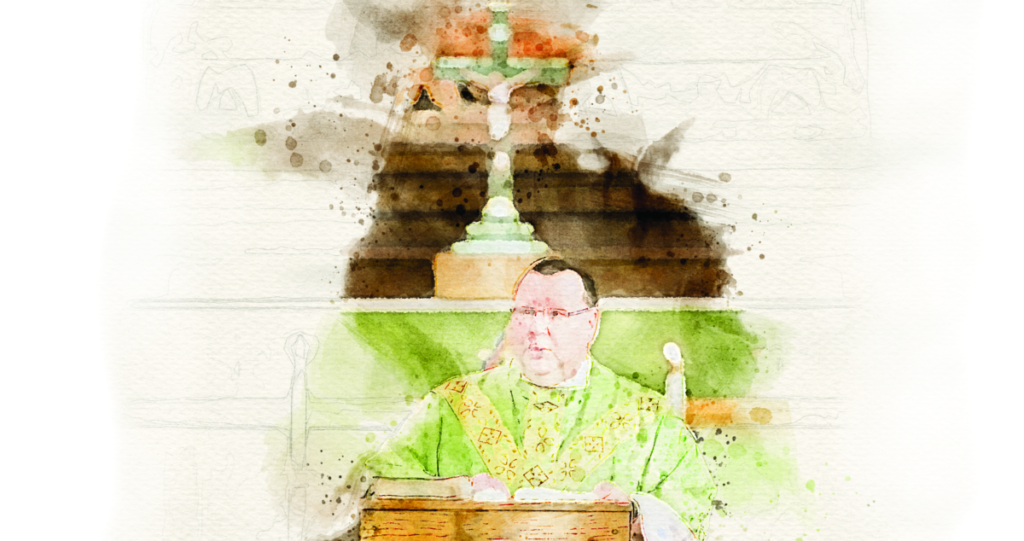by Mark Surburg
In his letter to the Galatians, Paul defends the truth that the Christian is justified by faith in Christ and not through works of the law (Gal. 2:16). In the first four chapters, Paul tells the Gentiles in Galatia that their inclusion in God’s people is already a fact through faith in Jesus Christ and has nothing to do with works of the law. In a rousing conclusion to this teaching, Paul writes, “For freedom Christ has set us free; stand firm therefore, and do not submit again to a yoke of slavery” (Gal. 5:1). Paul issues a final warning that pursuing the way of works and law will result in the loss of salvation: “You are severed from Christ, you who would be justified by the law; you have fallen away from grace” (Gal. 5:4).
It would seem that at this point, Paul’s work is done. He has admonished the Galatians that “in Christ Jesus you are all sons of God, through faith” (Gal. 3:26). He has destroyed the notion that anyone can be justified before God by works of the law (Gal. 3:10–11). Yet the apostle is not finished, and considering what he has just said, he moves in what seems to be a surprising direction. Paul has emphasized the crucial role that faith has in justification. Now he says, “For in Christ Jesus neither circumcision nor uncircumcision counts for anything, but only faith working through love” (Gal. 5:6). Faith in Jesus Christ justifies. Yet that is not all it does. Faith also works through love.
For freedom
After arguing for more than five chapters that Christians are free from the law, Paul makes an unexpected rhetorical pivot that plays off the statement about “freedom” in Galatians 5. He states, “For you were called to freedom, brothers. Only do not use your freedom as an opportunity for the flesh, but through love serve one another” (Gal. 5:13). The apostle warns that freedom from works for justification does not mean freedom for sin. Instead, this freedom is the setting in which faith works through love to serve others. Paul now says that love is a fulfillment of the whole law: “For the whole law is fulfilled in one word: ‘You shall love your neighbor as yourself’” (Gal. 5:14). He even exhorts the Galatians to help one another using striking language that includes the word “law”: “Bear one another’s burdens, and so fulfill the law of Christ” (Gal. 6:2).
In chapters 5 and 6, Paul speaks about how the Christian is to live. He does not assume that since we have received the Spirit through the hearing with faith (Gal. 3:2) and are justified, we will now just live according to God’s will. He knows the matter is not so simple as “a good tree produces good fruit.” Instead, Christians need exhortation and teaching about how we are to live. God wants us to live true to His will, and for that to happen, we need to hear exhortation and instruction.
Third use of the law
Lutherans call this exhortation and instruction the third use of the law. The first use of the law describes the fact that God’s Law maintains external discipline against unbelieving, disobedient people. The second use of the law brings people to a recognition of their sins (FC SD VI 1). The third use of the law is the manner in which the Spirit uses the law to repress, compel, admonish and teach the old Adam (FC EP VI 4; SD VI 9, 24). The word “use” quite naturally sounds like a description of the one using the law. However, here the word “use” refers to the effect (or effects) the law has on the individual. It is the Holy Spirit who uses the law to accomplish His purpose (FC SD VI 3, 11–14).
We need the Spirit to do this, and so we continue to need the law to be spoken to us in exhortation, admonition and teaching. Paul explains that the flesh is opposed to the Spirit: “But I say, walk by the Spirit, and you will not gratify the desires of the flesh. For the desires of the flesh are against the Spirit, and the desires of the Spirit are against the flesh, for these are opposed to each other, to keep you from doing the things you want to do” (Gal. 5:16–17). Through the work of the Spirit, the Christian is a new man. However, until we die or Christ returns, we are also still flesh — old Adam. The old Adam seeks to prompt and lead us into sin, even as the new man wants us to live according to God’s will.
Because of the flesh — the old Adam in us — we need to hear about how we are to live as Christians. Paul describes the works of the flesh that Christians are not to do (sexual immorality, impurity, sensuality, etc.) and how they prevent a person from inheriting the kingdom of God (Gal. 5:19–21). On the other hand, he says that the work of the Spirit produces the fruit of love, joy, peace and so on as he describes how we are to live (Gal. 5:22–23). He wants the Galatians to produce the fruit of the Spirit and not the works of the flesh: “And those who belong to Christ Jesus have crucified the flesh with its passions and desires. If we live by the Spirit, let us also keep in step with the Spirit” (Gal. 5:24–25).
This language of exhortation tells the Galatians and us what we are to do. Paul continues with more of this in chapter 6 as he urges:
“Do not be deceived: God is not mocked, for whatever one sows, that will he also reap. For the one who sows to his own flesh will from the flesh reap corruption, but the one who sows to the Spirit will from the Spirit reap eternal life. And let us not grow weary of doing good, for in due season we will reap, if we do not give up. So then, as we have opportunity, let us do good to everyone, and especially to those who are of the household of faith” (Gal. 6:7–10).
Holy Spirit’s work
It is true that exhortation like this is law, and the law always accuses (AP IV 38). However, the Spirit may use the law in more than one way as it accuses. The Spirit uses this accusation to reveal sin and cause repentance in us (second use of the law). But He also uses this accusation to repress, compel, admonish and teach the old Adam (third use of the law). The Spirit’s work of repressing the old Adam through the law aids the new man in his struggle against the old Adam so that the new man directs our actions. We need this exhortation and admonition because through it the Holy Spirit helps us to live according to God’s will.
The apostle wanted the Galatians to live in ways that were guided by the Spirit and not by the flesh (old Adam). He exhorted and encouraged the Galatians at the end of his letter. Martin Luther did not miss it. He wrote in his 1535 Galatians lectures:
“Therefore the apostle admonishes Christians seriously, after they have heard and accepted the pure doctrine about faith, to practice genuine works as well. For in the justified there remain remnants of sin, which deter and dissuade them both from faith and from truly good works” (LW 27:54).
Luther viewed what Paul does in Galatians as a model for Christian preachers. He went on to say, “This is why faithful preachers must exert themselves as much in urging a love that is unfeigned or in urging truly good works as in teaching true faith” (LW 27:54). Paul closes his letter to the Galatians with the language of exhortation through which the third use of the law occurs by the work of the Spirit. For the same reason, we continue to need exhortation, admonition and teaching so that we can live in ways that please our God.
This article originally appeared in print in the October 2020 issue of The Lutheran Witness.







I’m new to Lutheranism and this really helped me, especially that “we need to hear exhortation [to love and good works].” I was concerned Lutheran preaching might leave this kind of exhortation out and focus exclusively on our justification by faith. We need the third use of the Law as accepted by the Formula of Concord in our preaching to motivate us to walk in obedience to God’s commandments.
God bless your use of His Word.
Perhaps we can distinguish God-glorifying works-fruitfulness from self-promoting works-righteousness.
To be baptized is, among other things, to be received into a community of disciples. A disciple is, by definition, a learner — someone who seeks and receives instruction. Jesus said, “Take my yoke upon you, and learn from me.” (Matthew 11:29 ESV) And he plainly said that making disciples involved, in addition to baptizing, “teaching them to observe all that I have commanded you.” (Matthew 28:19-20 ESV)
Learning is motivated in part by exhortation, which can be demanding and threatening or gentle and encouraging. It is one thing to say, “Do this or else.” It is another thing to say, “If you know these things, blessed are you if you do them.” (John 13:17 ESV)
“By this my Father is glorified, that you bear much fruit and so prove to be my disciples,” said Jesus. (John 15:8 ESV). It is a remarkably open-ended vision, and we might ask anxiously, “How much is ‘much’?”
But if we are exercising anxiety then we are not exercising faith. If we return to trusting in our merits then we have stopped trusting in Christ’s. By faith we can look to God and trust “that he who began a good work in [us] will bring it to completion at the day of Jesus Christ.” (Philippians 1:6 ESV).
The Gospel is never an invitation to spiritual and moral laxity. It announces the way to a right relationship with God. Forgiveness (aphesis) means sending away an offense that would otherwise stand in the way of the fruitfulness of a relationship. So, trusting in Christ’s atonement on the cross, the faithful will gratefully aspire to fulfill the purposes in this life for which God has shown mercy and still supplies his gifts.
“Having gifts that differ according to the grace given to us, let us use them.” (Romans 12:6 ESV). “For we are his workmanship, created in Christ Jesus for good works, which God prepared beforehand, that we should walk in them.” (Ephesians 2:10 ESV) And we are “a people for his own possession, that [we] may proclaim the excellencies of him who called [us] out of darkness into his marvelous light.” (1 Peter 2:9 ESV)